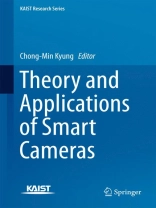This book presents an overview of smart camera systems, considering practical applications but also reviewing fundamental aspects of the underlying technology. It introduces in a tutorial style the principles of sensing and signal processing, and also describes topics such as wireless connection to the Internet of Things (Io T) which is expected to be the biggest market for smart cameras.
It is an excellent guide to the fundamental of smart camera technology, and the chapters complement each other well as the authors have worked as a team under the auspice of GFP(Global Frontier Project), the largest-scale funded research in Korea. This is the third of three books based on the Integrated Smart Sensors research project, which describe the development of innovative devices, circuits, and system-level enabling technologies. The aim of the project was to develop common platforms on which various devices and sensors can be loaded, and to create systems offering significant improvements in information processing speed, energy usage, and size.
This book contains extensive reference lists, introduces the reader to the subject in a tutorial style and also reviews state-of-the-art results, which allows it to be used as a guide for starting researchers.
قائمة المحتويات
PART 1 Fundamental/Energy-related Issues of Smart Cameras.- 1 CMOS Image Sensor for Smart Cameras; Jongho Park.- 2 Architectural Analysis of a baseline ISP pipeline; Hyun Sang Park.- 3 An Ultra-Low-Power Image Signal Processor for Smart Camera Applications; Zhenhong Liu, Nam Sung Kim.- 4 Foundations and Applications of 3D Imaging; Min H. Kim.- 5 E-R-D Optimization in video compression; Hyuk-Jae Lee, Hyun Kim, Chae-Eun Rhee.- PART 2 Event/Object Detectors for Smart Sensing.- 6 Low-Power Operation for Video Event Data Recorder; Jinyoung Yang, Jongpil Jung.- 7 Low Power Face Detection for Smart Camera; Hyung-Il Kim, Seung Ho Lee, Yong Man Ro.- 8 Accurate Face and Human Detection Using Hybrid Local Transform Features; Daijin Kim, Bongjin Jun.- 9 Adaptive Resource Management for Sensor Fusion in Visual Tracking; Bohyung Han, Seong-Wook Joo, Larry S. Davis.- 10 Traffic Pattern Analysis and Anomaly Detection via Probabilistic Inference Model; Hawook Jeong, Youngjoon Yoo, Kwang Moo Yi, Jin Young Choi.- 11 Event Detection Module for Low Power Camera; Byung-geun Lee, Moongu Jeon.- 12 Advanced Human Detection Using Fused information of Depth and Intensity Images; Gyu-Hong Lee, Dong-Suk Kim and Chong-Min Kyung.- PART 3 Wireless Connectivity for Video Sensor Networks.- 13 Time Synchronization for Multi-hop Surveillance Camera Systems; Hyuntae Cho.- 14 Distributed Medium Access for Camera Sensor Networks: Theory and Practice; Hojin Lee, Donggyu Yun, Yung Yi.- 15 Wireless Sensor Network for Video Sensors; Hyung Won Kim.
عن المؤلف
Chong-Min Kyung (Professor, KAIST) received B.S. in Electrical Engineering (EE) from Seoul National University in 1975, M.S. and Ph.D. in EE from KAIST in 1977 and 1981, respectively. He worked at Bell Telephone Laboratories, Murray Hill during 1981-1983. Since 1983, he has been Professor at the Department of EE at KAIST. He started Center for Integrated Smart Sensors (CISS) in 2011, sponsored as Global Frontier Project by Korean government. He has published over 300 international journal/conference papers on device physics/simulation, CAD, computer graphics, and System-on-a-Chip design including RISC/CISC microprocessors, VLIW and reconfigurable DSP cores, and video CODEC.
His current research focuses on applying system-level cost-energy-rate-distortion optimization techniques to the design of smart sensors, especially smart cameras.
He has led, as Founding Director, IDEC (IC Design Education Center) during 1995-2011. He received Best Paper Awards in numerous international conferences including ASP-DAC 1997 and 1998, DAC in 2000, ICSPAT in 1999, ICCD in 1999, ISOCC in 2009, and ISQED in 2014. He is a member of National Academy of Engineering Korea, and Korean Academy of Science and Technology, and IEEE Fellow.












